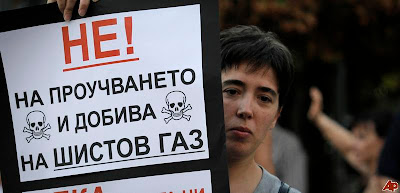
Bulgaria has unexpectedly pulled out of an agreement to allow the exploration and extraction of shale gas in its territory. On 19th January the parliament in Sofia passed a bill outlawing any exploration or extraction using the controversial method of hydraulic fracturing.
The ban applies to the whole country, including Bulgaria’s territorial waters in the Black Sea. Any company which violates the ban will face fines of up to 66 million dollars, as well as confiscation of equipment.
Hydraulic fracturing is the only known method of extracting gas from shale rock. It involves injecting a mixture of water, sand and chemicals under ground at high pressure. The mixture acts to free gas trapped in the pores of the shale rock. Environmentalists claim that the chemicals used in the process can contaminate ground water. They also say that earthquakes can arise as a result of the process.
********
In passing the bill, the Bulgarian government has revoked an exploration and extraction concession granted to US firm Chevron in the north-east of the country. The US ambassador to Bulgaria, John Warlick, had promised that Chevron could guarantee Bulgaria jobs and investment . However, the firm’s interests in Bulgaria are solely connected to shale gas and now the ambassador has warned that Chevron may pull out of the country completely.
Chevron, based in San Ramon, Califronia, was granted the concession in May 2011 in return for a payment of 30 million euros. The company had predicted to find 25 billion cubic metres of shale gas, almost 6 times the amount of gas that Bulgaria uses in a year. The Bulgarian government hailed the agreement as a success. Energy minister Traicho Kostov last year claimed, while on a visit to Warsaw, that Bulgaria’s shale gas deposits had been estimated at anywhere from 300 billion to 1 trillion cubic metres and could potentially meet the country’s energy needs for the next 100 years. Sofia had been counting on shale gas as a means to increase energy security. Currently, most of Bulgaria’s gas is supplied by Russia.
********
Despite all this optimism, the shale gas plans caused unease amongst environmentalists, society at large and farmers from the Dobrich province—considered to be the most beautiful region in Bulgaria. Dobrich was where Chevron had been due to start exploration. Many people were afraid that the hydraulic fracturing process would lead to ground and water pollution. “People always say that we should achieve energy independence, but if we go ahead with shale gas extraction we could end up becoming food dependent. We create a danger to our national security if we destroy agricultural production. Not only will our exports suffer but we might not have anything to eat”, says Milen Stoyanov, a protest organiser. On the 14th January, protests were held in 12 cities including Sofia, Varna, Burgas and Plovdiv. People held up placards carrying slogans such as ‘Don’t gas us!’, ‘We want bread, not gas!’ and ‘Send Traicho and Nona to prison!’ (referring to energy minister Traicho Traikov and environment minister Nona Karadjova) In the end, the ruling centre-right GERB party gave in to the wave of protests. In the parliamentary vote 166 of their MPs voted in favour of the shale gas ban, with only 6 voting against the bill.
********
Minister Kostov is obviously unhappy with the outcome of the vote. In a TV interview he said that the protests had been part of a well-organised and well-funded propaganda campaign which had succeeded in whipping up public hysteria. The Minister did not say who he thinks is behind the campaign but he did suggest that it would be possible to find out if one follows the money trail-“ Someone has profited from the decision to pull out of shale gas.” Others speak more openly. Iliyan Vassilev, former ambassador to Moscow, has accused the government of weakness and has claimed that the protest campaign was organised by pro-Russian elements. Russian firm Gazprom wants to sabotage American-led shale gas extraction in Europe, according to Vassilev. If shale gas is not exploited in Euope then German companies will have to continue buying gas from Russia, at a time when German energy demand will rise due to the phasing out of nuclear power. The former ambassador is confident that after a few months the Bulgarian government will return to its original shale gas plans.
Only time will tell if he is right. It is worth remembering that in June 2011 the French parliament, under pressure from environmentalists, banned shale gas exploration. It looks as if Pooand will be the only country in Europe to go ahead with plans to exploit shale gas deposits. Worldwide it is another story, however. The USA has become a gas giant thanks to shale and both India and China keen to follow suit.
Author: Marek Karolkiewicz Taken form ‘Przegłąd’ magazine nr.5 (631) 5/02/12
The original Polish article can be read here.
5 comments:
all of which have been presented by this website was perfect, good appearance and artikelnya..penuh color and full of meaning .. cara memperbesar penis dengan mudah
Nice post, you have good writing skill
Thank you for sharing this amazing post
Visit my travel blog : Bali Driver and Bali Tours
evisa vietnam
வியட்நாம் விசா
Vietnam Visa à l'arrivée
Need Vietnam Visa
Vietnam Visa
Vietnam Viza
Vietnam visa in Portuguese
viajes vietnam
Visado para Vietnam
viaje vietnam visado
thank
Manfaat Yoghurt
bandung lagi ey
Post a Comment